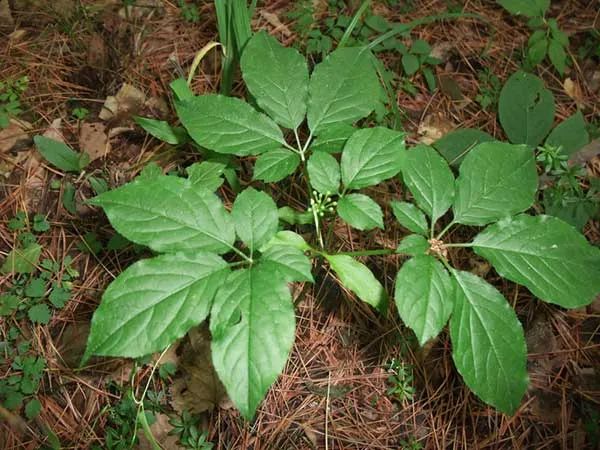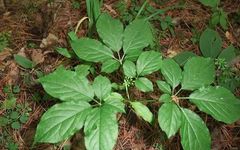


Ginseng (Renshen) is a perennial herb that prefers cool, shady environments. It typically flowers in three years and bears fruit in five to six years, with flowering occurring from May to June and fruiting from June to September. It grows in mixed coniferous and broadleaf forests dominated by red pine at altitudes of several hundred meters between latitudes 33° and 48° north, primarily found in Northeast China, Korea, Japan, and Eastern Russia. Ginseng is known as the “King of Herbs” and is one of the famous “Three Treasures of Northeast China” (Ginseng, Sable Fur, Deer Antler), recognized both domestically and internationally as a valuable medicinal material. Ginseng is known for its ability to greatly replenish vital energy (yuanqi), stabilize the pulse, strengthen the spleen and lungs, and is suitable for conditions such as deficiency of qi and blood, weakness, spleen deficiency with cough, internal heat with thirst, and impotence due to kidney deficiency.
Effects and Functions of Ginseng
1. Improves Heart Function: Ginseng can enhance myocardial contractility, slow the heart rate, and increase cardiac output and coronary blood flow, providing protection against myocardial ischemia and arrhythmias.
2. Reduces Blood Sugar: Ginseng is rich in ginsenosides and ginseng polysaccharides, which can lower blood sugar levels.
3. Regulates the Central Nervous System: Ginseng can modulate the central nervous system, enhancing both mental and physical work capacity, improving efficiency, and combating fatigue.
4. Boosts Immune Function: Ginseng is rich in ginsenosides and ginseng polysaccharides, which can regulate immune function.
5. Anti-Hypoxia and Temperature Resistance: Ginseng contains ginsenosides that enhance stress resistance, allowing for better tolerance to hypoxia, high temperatures, and low temperatures.
6. Anti-Tumor Effects: Ginseng is rich in ginsenosides, ginseng polysaccharides, ginsenoside compounds, and volatile oils, which can inhibit tumor growth.
7. Anti-Aging: Ginseng contains various antioxidants, ginsenosides, ginseng polyacetylenes, and ginsenoside compounds that can provide anti-oxidative and anti-aging effects.
What to Consider When Consuming Ginseng?
1. Ginseng should not be overused or consumed in excess.
2. Avoid using iron pots for cooking ginseng.
3. Pay attention to seasonal changes when consuming ginseng; generally, it is better to consume it in the cool autumn and winter months, while it is not advisable to consume it in the hot summer months.
How to Select Ginseng?
When selecting ginseng, choose those with fine roots. Generally, high-quality ginseng has thick branches, long rhizomes, thin skin, a tender yellow color, dense markings, is plump, juicy, and free from damage.
How to Store Ginseng?
When storing ginseng, consider its moisture content. Drier ginseng can be sealed in a bag and stored in a cool place. If the ginseng is moist, it should be sun-dried for 2 hours, then packaged in a plastic bag and stored in the refrigerator. Another method is to place some charcoal or lime in a jar or box, seal the ginseng in a plastic bag, and store it in the jar or box.
Source: Heyang MediaInitial Review: Sun JiananRe-review: Jin ShanFinal Review: Liu Yufeng

